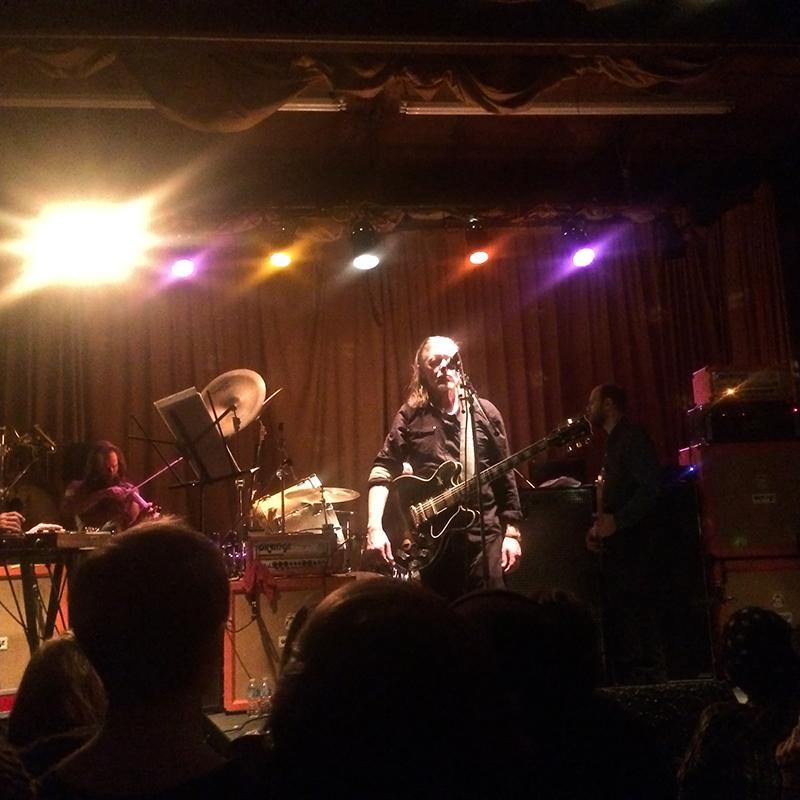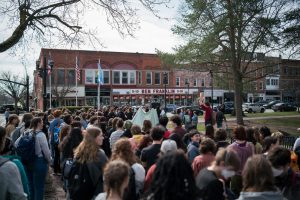Enigmatic Instrumentation, Atmospheric Elements Entrance Crowd
Swans frontman Michael Gira stares down showgoers at the Beachland Ballroom and Tavern in Cleveland. He led his band through a deafening, lengthy set Wednesday night.
February 27, 2015
From the opening moments of their set at Cleveland’s Beachland Ballroom and Tavern Wednesday night, Swans made it clear that they did not plan on granting their audience a standard concert experience.
The New York post-punk veterans, who performed for nearly three hours but only played six songs, started so quietly that attendees didn’t even register they had begun and utilized everything from a hammer dulcimer to wind chimes to a homemade viola in pursuit of auditory devastation. Clearly, nothing about the set adhered to audience expectations of what a rock show consists of, but despite this, infamously demanding frontman Michael Gira and his five bandmates managed to offer one of the most powerful concerts I’ve ever attended.
Percussionist Thor Harris introduced Swans’ set by himself. He stood near the backstage area, hitting a gong softly. As the gong grew louder, alerting the audience to Harris’ presence, other members of the band joined in. Lap-steel guitarist Christoph Hahn droned forebodingly, and Phil Puleo, the band’s other drummer, complemented Harris’ gong with tasteful cymbal work. The band built up slowly, silencing chatty showgoers. My jaw dropped as Swans’ entrance manifested both sonically and visually. Band member after band member appeared on stage, each time ramping up the intensity of the build, which, like much of Swans’ music, included just a single, repeated chord over steady percussion.
About 10 or 15 minutes into this build, which eventually reached such a monumental volume that I could feel the sound more than I could hear it, I realized that Swans’ increasing age was not going to stop them from playing a monolithic set. Perhaps they have calmed down a bit, though: the 61-year-old Gira didn’t physically assault headbangers, lock his crowd into the venue or turn the heat up oppressively high Wednesday evening, as he did during Swans’ initial pre-breakup run in the 1980s. Swans even incorporated elements other than the crushing heaviness they became known for on early records like Filth and Cop, emphasizing meditative droning and other idiosyncratic sounds throughout their set. They didn’t skimp on brutality, though. In fact, Swans’ usage of atmosphere, which has become more central to their sound with each record they’ve released, contrasted with their signature apocalyptic climaxes and thereby imbued these cathartic moments with even more weight.
Swans demonstrated an ability to combine overwhelming noise, fearless experimentation and their recent interest in incorporating funk and blues segments on songs like “A Little God In My Hands,” the lead single from 2014’s universally acclaimed To Be Kind. The song featured a menacing bass groove punctuated by stabs of atonal horns and slurred, abstract lyrics (“Pink little lamb on a granite slab / Black chasm creeping, forever leaking”). Somehow, despite the fact that bassist Christopher Pravdica repeated this riff for more than twice the length of the album version’s already formidable seven minutes, “A Little God In My Hands” didn’t get boring for a second. Like Swans’ set as a whole, the track held my focus through endless iterations of the same motif via subtle changes in force and texture.
Of the six songs Swans played Wednesday night, three were brand new, and a fourth — “Bring the Sun/Black Hole Man” — included mostly new material in addition to older selections. The band’s most recent record came out under a year ago, and their apparently constant songwriting, ever-expanding musical palette and grueling 10-hour-a-day practice schedule display that Swans are as committed to making their mark as they have always been.


























